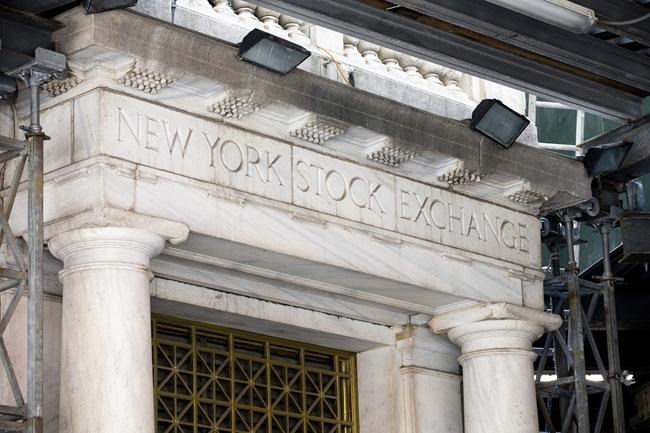NEW YORK (AP) — Wall Street closed lower, its big rally losing momentum despite fatter-than-expected profit reports from big companies and the latest signals of a resilient economy. The S&P 500 fell 0.6% Thursday after touching its highest level in nearly 16 months. The Nasdaq flipped from an early gain to a loss of 0.5%. The Dow lost 237 points, or 0.7%. Earlier in the day, it seemed to be on the verge of its 14th straight gain, which would tie a win-streak record set in 1897. Critics have been saying the market’s big recent rally has been too much, too fast.
THIS IS A BREAKING NEWS UPDATE. AP’s earlier story follows below.
NEW YORK (AP) — Wall Street is fading Thursday, and its big rally is losing momentum despite fatter-than-expected profit reports from big companies and the latest signals of a resilient economy.
The S&P 500 was 0.7% lower in late trading after touching its highest level in nearly 16 months, and the Nasdaq composite flipped from an early gain to a loss of 0.6%. The Dow Jones Industrial Average was down 255 points, or 0.7%, at 35,265 with less than than 20 minutes remaining in trading.
Honeywell International was a heavy weight on the market despite reporting stronger profit for the spring than analysts expected. It dropped 5.3% after its revenue fell short of analysts' expectations, as did its forecast for earnings in the current quarter.
The dip for Wall Street put a halt to a torrid run where the Dow climbed for 13 straight days. Earlier Thursday, it seemed to be on the verge of tying a win-streak record set in 1897.
Stocks have been roaring on hopes the Federal Reserve can pull off what seemed like a long-shot bet earlier this year: successfully pull down high inflation by raising interest rates without sending the economy into a painful recession.
But critics have been saying the market's sharp move upward has been too much, too fast and that the market's growing consensus about a “soft landing” for the economy is hardly a certainty.
“The move is very explainable, but I stop short of calling it justifiable because I think it’s too early to go all in on the idea that the Fed can claim victory” over high inflation, said Bryant VanCronkhite, managing director and senior portfolio manager at Allspring.
“We still have to be humble about our ability to predict the long-term effects of what we’re living through, including the rapid rise in interest rates and recovery from a pandemic that forced massive changes in the labor force and supply chains.”
Reports on Thursday were mostly encouraging about the economy, but VanCronkhite said they could also keep the pressure up on inflation. That in turn could push the Federal Reserve to keep interest rates tighter than expected, keeping alive the threat of a recession.
In the bond market, Treasury yields rallied after the wave of reports indicated the economy is in stronger shape than expected.
One estimate said growth for the overall economy accelerated in the spring. That easily topped forecasts from economists, who were expecting a slowdown from the first three months of the year. That report also suggested a measure of inflation wasn’t as high from April through June as expected.
Another report, meanwhile, said that fewer workers applied for jobless benefits last week. It’s the latest indication the job market remains remarkably solid, while a third report said orders for long-lasting manufactured goods strengthened more than expected last month.
The Federal Reserve on Wednesday raised its federal funds rate to its highest level in more than two decades in hopes of dragging inflation lower. High rates work by bluntly slowing the entire economy and hurting prices for stocks and other investments.
Fed Chair Jerome Powell on Wednesday, though, said any further increases in rates will depend on what reports say about the path of inflation and economy in the future. That bolstered hopes among traders that Wednesday’s increase may have been the final one of this cycle.
The yield on the 10-year Treasury rose to 4.00% from 3.87% late Wednesday. It helps set rates for mortgages and other important loans.
The two-year Treasury yield, which moves more on expectations for the Fed, rose to 4.92% from 4.85%.
Thursday's drops for stocks came despite a stronger-than-expected profit report from Meta Platforms, one of Wall Street's most influential stocks. The owner of Facebook, Instagram and WhatsApp attracted additional active members, and its stock rose 4.6%. .
McDonald’s rose 1.3% after it easily topped analysts’ forecasts for profits during the spring. Its sales grew worldwide.
Stocks also climbed in Europe after the European Central Bank raised interest rates and left unanswered whether more increases are coming. The French CAC 40 jumped 2.1%, and Germany’s DAX returned 1.7%.
Asian stock indexes were also mostly higher, led by a 1.4% rally for Hong Kong’s Hang Seng.
___
AP Business Writers Matt Ott and Elaine Kurtenbach contributed.
Stan Choe, The Associated Press




